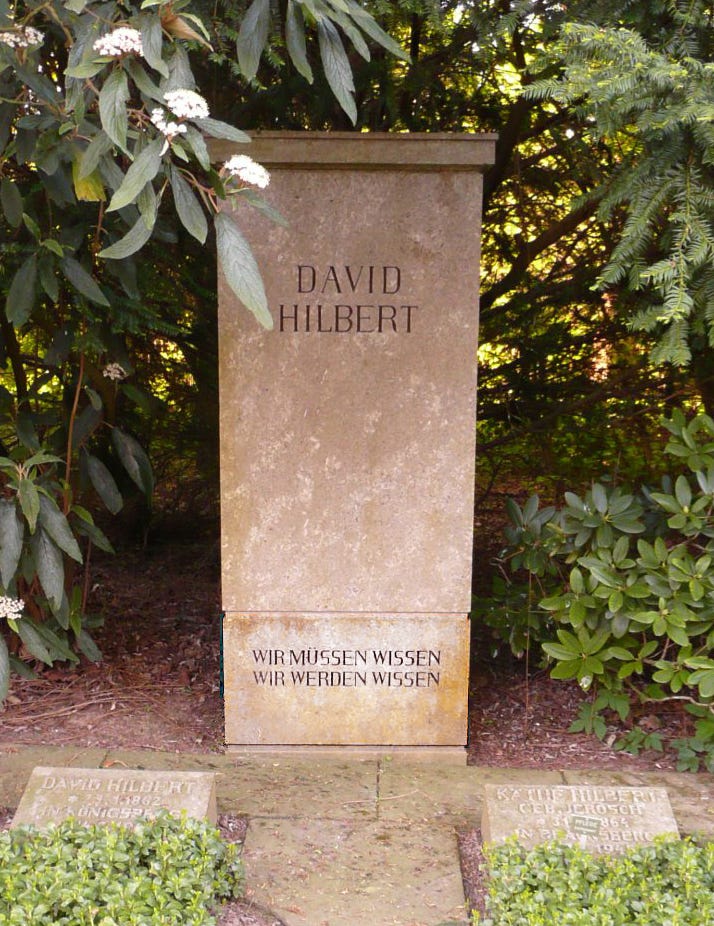Hilbert's Foundations of Algebraic Invariants: A Key Milestone
Written on
Chapter 1: Introduction to David Hilbert
David Hilbert (1862–1943) was a notable German mathematician whose expertise spanned numerous fields of mathematics. He introduced the concept of Hilbert spaces in analysis and the Hilbert matrix in approximation theory. Hilbert's work extended to radiation physics, the kinetic theory of gases, and even the general theory of relativity, alongside significant contributions to algebraic number theory, algebraic invariants, commutative algebra, and the calculus of variations. His profound impact on mathematics is undeniable.
Hilbert's legacy includes groundbreaking theorems such as the Basis Theorem, Nullstellensatz, Satz 90, and the irreducibility theorem. He stands out as one of the most influential mathematicians of the late 19th and early 20th centuries, inspiring a plethora of future mathematicians.
Section 1.1: Early Life and Education
Hilbert embarked on his university studies at Königsberg, where he was fortunate to learn under Heinrich Friedrich Weber (1843–1912), the only full professor of mathematics at the time. During his studies, he forged a lasting friendship with Herman Minkowski (1864–1909), a prodigy who earned accolades from the Paris Academy at just 17. Their camaraderie greatly influenced their respective mathematical pursuits.
In 1885, Hilbert completed his doctoral dissertation, “On the Invariant Properties of Special Binary Forms, Particularly the Spherical Harmonic Functions,” under the guidance of Ferdinand Von Lindemann (1852–1939). He subsequently served as a Privatdozent at the same university for a decade before Felix Klein (1849–1925) encouraged him to join the University of Göttingen as a mathematics professor, transforming it into a vibrant center of mathematical research.
The first video explores prominent mathematicians, including Hilbert, and highlights their influential contributions to the field of mathematics.
Section 1.2: The PhD Thesis and Early Research
When selecting a topic for his doctoral research, Hilbert considered exploring the generalization of continued fractions but was steered towards the theory of algebraic invariants instead. This theory, rooted in René Descartes' (1596–1650) analytical geometry, established connections between algebraic equations and geometric figures.
Hilbert's doctoral work focused on the invariant properties of specific algebraic forms, a challenging subject that he approached with originality. His advisor, Lindemann, recognized the significance of Hilbert's results, which deviated from conventional methods of the time. Minkowski, upon reading Hilbert's dissertation, praised its depth and originality.
Hilbert's public defense in 1885 included defending two propositions, one related to electromagnetic resistance and another concerning philosophy. He was sworn in with an oath to uphold the integrity of scientific inquiry.
Chapter 2: Collaborations and Career Progression
After earning his doctorate, Hilbert toured Europe, meeting renowned mathematicians such as Felix Klein in Leipzig and Henri Poincaré (1854–1912) in Paris. Following his return to Königsberg, he became a privatdozent, relying on student fees for his income. In 1892, he attained the role of assistant professor, later securing a full professorship at Göttingen.
This video delves into Hilbert's life and work, particularly focusing on his contributions to algebraic theory and the impact of his teachings.
Section 2.1: Hilbert's Proof of the Finiteness Theorem
In 1888, Hilbert established the Finiteness Theorem, a significant achievement that built upon Paul Gordan's (1837–1912) earlier attempts at similar proofs. Hilbert's innovative approach led to the formulation of his basis theorem, demonstrating the existence of a finite set of generators for quantics with varying numbers of variables.
Initially, Gordan failed to recognize the importance of Hilbert's work, dismissing it as "not mathematics" but "theology." In contrast, Felix Klein acknowledged its value and encouraged further development of Hilbert's ideas, ultimately leading to its publication and widespread recognition.
Chapter 3: Later Years and Legacy
Hilbert's career faced a significant setback in 1930 when Adolf Hitler's regime forced him into retirement, implementing laws that barred Jewish scholars from academic positions. Many eminent mathematicians, including Hilbert's colleagues, suffered under these discriminatory policies. In a poignant remark, Hilbert noted the decline of mathematics in Göttingen due to these changes.
Hilbert passed away in 1943 at the age of 81 in Göttingen, leaving behind a legacy that continues to resonate in the field of mathematics. Hermann Weyl, one of his notable students, remarked on his exceptional character and commitment to freedom, highlighting Hilbert's lasting influence on the discipline.

References: Book: Hilbert, Constance Reid
Thank you for engaging with this overview of David Hilbert's life and contributions. Your feedback and comments are always welcome!
Please subscribe to my newsletter to stay updated with future articles. Your support is appreciated!